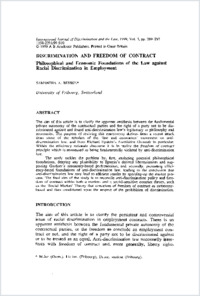Discrimination and Freedom of Contract : Philisophical and Economic Foundations of the Law agains Racial Discrimination in Employment
- Besson, Samantha Université de Fribourg
-
1999
Published in:
- International Journal of Discrimination and the Law. - 1999, no. 3, p. 269-297
English
The aim of this article is to clarify the apparent antithesis between the fundamental private autonomy of the contractual parties and the right of a party not to be discriminated against and found anti-discrimination law's legitimacy in philosophy and economics. The purpose of reviving this controversy derives from a recent attack from some of the scholars of the 'law and economics' movement on anti-discrimination law, and from Richard Epstein's Forbidden Grounds in particular. Within the efficiency rationale discourse it is in reality the freedom of contract principle which is reassessed as being fundamentally violated by anti-discrimination law. The study tackles the problem by, first, analyzing potential philosophical foundations, denying any plausibility to Epstein's derived libertarianism and supporting Gardner's autonomy- based perfectionism, and, secondly, presenting efficiency-based foundations of antidiscrimination law, leading to the conclusion that anti-discrimination law may lead to efficient results by speeding-up the market process. The final aim of the study is to reconcile anti-discrimination policy and freedom of contract within both a market- and a social-sensitive contract theory, such as the 'Social Market' Theory that conceives of freedom of contract as autonomybased and thus conditioned upon the respect of the prohibition of discrimination.
- Faculty
- Faculté de droit
- Department
- Département de droit international et droit commercial
- Language
-
- English
- Classification
- Law, jurisprudence
- License
-
License undefined
- Identifiers
-
- RERO DOC 28126
- DOI 10.1177/135822919900300404
- Persistent URL
- https://folia.unifr.ch/unifr/documents/302201
Statistics
Document views: 102
File downloads:
- Texte intégral: 252
